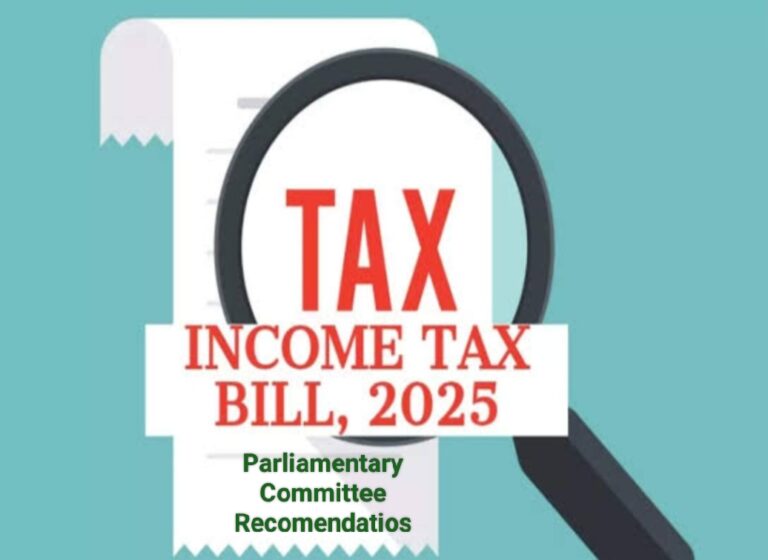The Income Tax Bill, 2025, introduced to replace the Income-tax Act, 1961, represents a major overhaul of India’s direct tax regime aimed at simplification, transparency, and consistency. To ensure comprehensive stakeholder engagement, the Lok Sabha referred the Bill to a Parliamentary Select Committee, chaired by MP Baijayant Panda, which comprised 31 members.
After reviewing representations from industry bodies, tax professionals, and legal experts, the committee submitted its report to Parliament on 21st July 2025, making 285 detailed recommendations. The committee focused on balancing the government’s revenue interests with taxpayer convenience, procedural fairness, and legal certainty.
Key areas addressed include:
- Relief for small taxpayers and charitable institutions,
- Clarifications on deductions and definitions,
- Discretion in enforcement provisions,
- Time-bound dispute resolution, and
- Enhancements to corporate tax clarity and non-profit regulations.
The recommendations aim to make the new tax code more taxpayer-friendly, reduce unnecessary litigation, and ensure ease of compliance ahead of the proposed implementation date of April 1, 2026.
Here are the key recommendations of the Lok Sabha’s Parliamentary Select Committee on the Income‑Tax Bill, 2025, presented in the Lok Sabha on 21 July 2025 (report by MP Baijayant Panda, 31 members, offering 285 suggestions).
✅ Simplification & Procedural Safeguards
- Penalty-free late TDS refund claims & ITR filings
Individuals (especially small taxpayers) filing ITRs merely to claim refunds won’t be penalized for late filing. The panel also suggested exemptions from mandatory ITR filing where no tax is owed. - Income‑tax rebate clarity & simplified provisions
To reduce confusion, the committee urged clarity in rebate rules and standard deductions, including a 30% property income deduction post municipal tax payment.
🏛️ Corporate & Non‑Corporate Provisions
- Restore inter‑corporate dividend deduction
The panel recommended reinstating deductions on dividends received by companies from other domestic companies—supporting India Inc’s cash flow. - Clarify ‘beneficial owner’ for loss carry‑forward
Amend the definition to include individuals who indirectly benefit from shares, ensuring smoother utilization of carried-over losses.
🕕 Tax Litigation, GAAR & Enforcement
- Time‑bound disposal of tax disputes
To ease litigation congestion, the committee recommended strict timelines for resolution of tax cases. - Discretionary power on penalties
Penalties for non‑maintenance of books or unintended non-compliance should be at the discretion of the tax officer, not automatic. - Restoring zero‑tax TDS certificates & GAAR safeguards
Suggested reinstatement of nil‑deduction certificates for non-residents, along with well-defined beneficial‑owner norms to ease cross-border investments.
🎗️ Pro‑NPO Measures
- Protect anonymous donations to religious-cum-charitable trusts
The committee advised retaining exemptions for such contributions, instead of taxing them at a flat 30%, to avoid disrupting mixed-purpose NGOs. - Use ‘income’ (not ‘receipts’) in NPO definition
To align tax treatment with net gains (not gross inflows), the committee recommended modifying Clause 335 to revert language accordingly.
🏠 Technical Alignments & Code Coherence
- Align ‘capital asset’ definition with Finance Act 2025
Ensures consistency and removes potential ambiguity. - Clarify standard deduction structure post municipal tax
Ensures the 30% standard deduction on ”house property” income aligns with actual taxable value. - Harmonize definitions
Terms such as “micro & small enterprises,” “parent company,” and “co-operative bank” should mirror definitions in relevant statutes for consistency. - Retain Section 131(1A) language
Reinstate and restrict this provision to local tax officers to safeguard due process. - Eliminate all residual references to the 1961 Act
Convert the bill into a fully self-contained, litigation‑resistant code.
📊 Summary Table of Major Recommendations
| Area | Key Recommendation |
|---|---|
| TDS/ITR Refunds | Penalty‑free late claims, no mandatory ITRs for refunds |
| Corporate Tax | Restore inter‑corporate dividend deduction, clarify loss carry‑forward definition |
| Litigation | Enforce time‑bound resolution, introduce discretionary penalties |
| NPOs | Exempt anonymous donations, prefer ‘income’ over ‘receipts’ |
| Definitions & Deductions | Standard property deduction, align capital asset, harmonize definitions |
| Code Clarity | Retain Section 131, eliminate outdated references |
The revised report was submitted on 21 July 2025 and aims to make the new law effective from April 1, 2026.
Closing: Way Forward on the Income Tax Bill, 2025
The recommendations of the Parliamentary Committee mark a significant step toward shaping a modern, equitable, and administratively efficient income-tax regime in India. By addressing long-standing concerns—such as procedural burdens, tax ambiguity, and disproportionate compliance costs—the committee has laid a foundation for a more inclusive and less adversarial tax system.
As the government considers these recommendations, the final version of the Income Tax Act, 2025 will play a critical role in fostering taxpayer trust, enhancing voluntary compliance, and aligning the tax code with India’s evolving economic landscape. The emphasis on simplification, clarity, and timely resolution of disputes also reflects a broader commitment to good governance and investor confidence.
Going forward, successful implementation will depend not only on legislative reforms but also on effective rule-making, transparent administration, and robust taxpayer education.
